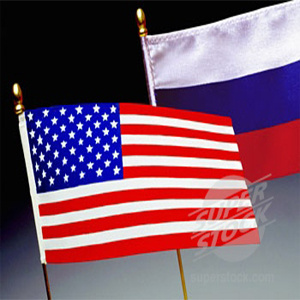How Tehran can improve Russia-US relations.
Obama’s Presidency and the Future of Iran-Russia-US Trilateral Ties
Comment by Dr. Bahram Amir Ahmadian, Russian affairs’ expert for Iranian Diplomacy.

 In her joint press conference with the Czech Foreign Minister Karel Schwarzenberg, US Secretary of State Hillary Clinton clarified that abandoning the missile shield project depends on Iran giving up its nuclear ambitions. Meanwhile, Joe Biden’s call for a fresh start in relations between Washington and Moscow has been warmly welcomed by Russian Deputy Prime Minister Sergei Ivanov.
In her joint press conference with the Czech Foreign Minister Karel Schwarzenberg, US Secretary of State Hillary Clinton clarified that abandoning the missile shield project depends on Iran giving up its nuclear ambitions. Meanwhile, Joe Biden’s call for a fresh start in relations between Washington and Moscow has been warmly welcomed by Russian Deputy Prime Minister Sergei Ivanov.However, some political analysts believe that Russia and United States have a long way to go in agreeing over Iran. The questions that come up here relate to Tehran’s role in improving Kremlin-White House relations and the impact of US new approach towards Iran in its ties with Russia.
Comment by Dr. Bahram Amir Ahmadian, Russian affairs’ expert for Iranian Diplomacy:
As a neighbor that has had decades of strategic relations and commercial and technological exchanges with Russia, Iran is a weighty country in the region and Moscow is fully aware of this.
Iran has been admitted as an observer in Shanghai Cooperation Organization (SCO) and is about to become a permanent member of the security treaty organization. This will raise Iran to a higher position in regional relations. Meanwhile, Russia moves according to national interests in its international relations. It will face away from Iran if it finds outs better ways for fulfilling these interests since Russia knows that there are no permanent allies or enemies in foreign relations, but only permanent interests.
On the other hand, plans to install a missile shield in Eastern Europe, close to Russian borders, has controlling missile activities of Iran and North Korea as an excuse. The plan is regarded by Russia as a threat against its national interests and has strained bilateral ties between the two powers. However, with Obama’s presidency it seems that United States gets less threatening vibrations and will redirect its policies. As recently announced, America will install the missile shield with Russians’ cooperation.
Seemingly, Obama has revised Bush’s foreign policies. The missile shield had a dual purpose: to control Russia’s western borders and to restrict Iran’s missile activities but the climate has changed now. The Bush administration rejected Russia’s cooperation in the missile shield plan, but Obama is acting the opposite. This is a significant turn which inserts Iran into the diplomatic equation. On the one hand, United States announces that its ready to negotiate with Iran and on the other hand, Moscow shows inclination for cooperation with Washington.
The tough air of Bush’s presidential term seems to have loosened, giving way to a more compromising dialogue. Hence, Iran should seize this opportunity which may not happen again. In addition, with Iran’s nuclear file still on IAEA table, negotiation is always an option. Taking into consideration both Iran’s and its own interests (drawn from long-term cooperation with Iran), Moscow can put its neighbor’s demands forward and act as a broker, between two of its close allies.
It seems that the Russian President Dmitri Medvedev views the issue from a broader perspective. SCO members are now aligned to play against Washington under Moscow’s supervision. Here, Shanghai Cooperation Organization (which includes four Muslim members) can satisfactorily cooperate with the United States to establish peace and security in Afghanistan. With the responsibilities conferred from NATO to SCO, frictions between Afghans and peace-keeping forces reduce.
Our region is undergoing developments and it is the best time for Iran to practice its influence. Tehran can engage in security arrangements by joining the Shanghai Cooperation Organization. It may even outdo far-from-hotspot Russia and China and militarily weak Central Asian states. This way Iran can touch off more rational relations between Russia and the United States in a new era. Russia reciprocally sets the ground for Iran to join further regional cooperation arrangements. However, this depends on development of regional cooperation itself. Iran may not be able to engage with American directly, but it can play a role in regional relations via Russia.

